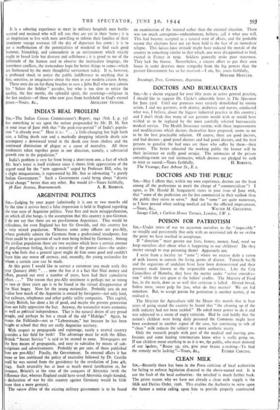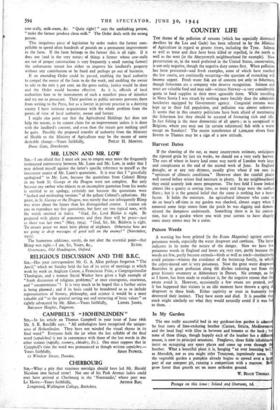CLEAN MILK
Six,—Recently there has been in the Press criticism of local authorities for failing to enforce legislation directed to the above-named end. It is not the fault of the local authorities: the mischief is much farther back. The prime reason why we have not already a clean milk supply is the Milk and Dairies Order, 1926. This enables the Authority to serve upon the farmer a notice calling upon him to provide properly constructed cow-stalls, milk-room, &c. "Quite right! " says the unthinking person, " make the farmer produce clean milk." The Order deals with the wrong person.
This iniquitous piece of legislation by order makes the farmer com- pellable to spend often hundreds of pounds on a permanent improvement to the farm. If the farm belongs to the farmer this is all right. If it does not (and in the very naturc of things a farmer whose cow-stalls are not of proper construction is very frequently a small renting farmer) the unfortunate tenant has either to improve his landlord's property without any contribution or be fined and perhaps go out of business.
If an amending Order could be passed, enabling the local authority to compel the owner of the farm to do the work, and enabling the owner to add to the rent 5 per cent. on the gross outlay, justice would be done and the Order would become effective. As it is, officials of local authorities hate to be instruments of such a manifest piece of injustice and try not to prosecute. Their position as public servants prevents them from writing to the Press, but as a lawyer in private practice in a dairying county I have intimate acquaintance with the whole problem from the points of view of local authority, owner and farmer.
I might also point out that the Agricultural Holdings Act does not help the tenant, as he cannot claim for an improvement unless it is done with the landlord's consent, and even then the tenant gets nothing until he quits. Possibly the proposed transfer of authority from the Ministry of Health to the Ministry of Agriculture may be the means of some































 Previous page
Previous page